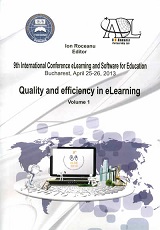DIMENSIONS OF INTERPERSONAL RELATIONS IN E-LEARNING
DIMENSIONS OF INTERPERSONAL RELATIONS IN E-LEARNING
Author(s): Maria Magdalena Stan, Mihaela PĂIŞI LĂZĂRESCUSubject(s): Education
Published by: Carol I National Defence University Publishing House
Keywords: socializing; interpersonal relationships; e-learning; teacher-student relationships
Summary/Abstract: The learning systems in electronic format based on interactivity represent one of the ways of diversifying and multiplying of interpersonal relationships. The interpersonal relationships among which we can mention the teacher-student relationships manifest as interactions between individuals that lead to information, material and affective exchange. This paper starts from the idea that in the context of using the computer in the learning activity, the traditional interpersonal relationships, including the teacher-student relationships gain new dimensions, and it focuses on a comparative analysis of this relationship. The analysis has been made from the perspective of the identification of the characteristics of the teacher-student relationships in elearning at different ages in different educational environments, both from the teacher’s perspective and from the students’. Implicating the computer in education does not diminish or exclude the role of the teacher and the relationship with other students. The teacher has a remarkable contribution, but not in the traditional way. The independence granted to the one that is learning does not exclude the role of the teacher and the communication with the others. The lack of the face-to-face human contact, considered essential for human socializing is compensated by major positive effects of colaboration and cooperation which enlarge the area of human contacts. The psychosocial perspective in e-learning stimulates the process of socializing and learning through cooperation and diversifies the nature of relationships of interpersonal communication. The cooperation through e-learning favours not only individual responsibility, but also the development of social abilities.
Journal: Conference proceedings of »eLearning and Software for Education« (eLSE)
- Issue Year: 9/2013
- Issue No: 01
- Page Range: 65-69
- Page Count: 5
- Language: English

